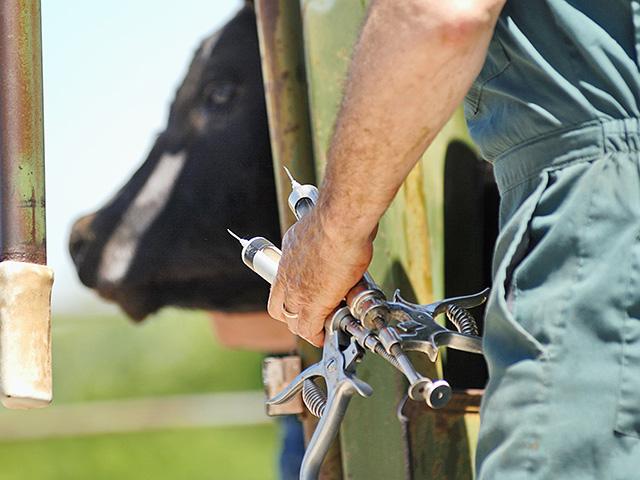Don't Get Stuck
Tips to Prevent Needlestick Injuries When Vaccinating Livestock
OMAHA (DTN) -- With many livestock producers performing routine veterinary work themselves, it's important they take safety precautions around needles when vaccinating animals, experts caution. While generally minor, needlestick injuries can lead to more serious health issues.
According to the Upper Midwest Agricultural Safety and Health Center (UMASH), over 80% of farm workers vaccinating animals have accidently stuck themselves with a needle (http://umash.umn.edu/…). Vaccines are the most common type of drug involved in needlestick injuries.
A report from last fall from South Dakota State University (SDSU) Extension said producers should educate themselves and their employees on the proper protocols when administering injections to livestock (https://extension.sdstate.edu/…).
NEEDLESTICKS A BIG DEAL?
The first thing livestock producers should ask themselves is if needlesticks are a big deal. Some of the most common injuries that can occur are skin infections, allergic reactions and deep-tissue wounds that may require surgery.
"However, some less common but more serious injuries that can occur and possibly even cause death include miscarriages due to hormone products, a serious cardiovascular event, suppression or coma, systemic infections and allergic reaction to antibiotics," according to the report.
UMASH recommends producers consider several safety protocols when administering vaccines or treatment of animals.
P[L1] D[0x0] M[300x250] OOP[F] ADUNIT[] T[]
The first thing is to slow down and don't rush injections, as this is when mistakes happen. Along that same line, properly restraining animals will go a long way to avoiding needlesticks.
UMASH also suggests not recapping needles, not putting needles/syringes in your pockets, not holding caps in your mouth and discarding bent or dull needles.
If you do get stuck, what should you do? UMASH suggests washing the skin with soap and water immediately. Report the injury to your supervisor and call your healthcare provider.
Those working around needles need to be especially careful with some products that are more dangerous if they get injected into the human body. These products include Tilmicosin (Micotil), sedatives, oil-based products or vaccines, Brucella abortus Strain RB51 vaccine, modified live vaccines, Johne's vaccine, hormones (especially if pregnant) and antibiotics (especially if allergic).
Livestock operation management should train employees properly on safe handling, safe injection procedures and the type of drugs used. Retraining employees to reinforce safety procedures is also vital.
NEEDLE DISPOSAL IMPORTANT
The correct disposal of needles is also an important aspect of treating livestock. UMASH said livestock-related needles are considered medical waste and if not disposed of properly, could pose a significant risk of injury or illness to farmers and waste handlers.
After use, needles should be immediately placed in a disposable container. If a Food and Drug Administration (FDA)-approved container is not available, use laundry detergent bottles as an alternative. Label the container "Sharps -- Do not recycle" to warn of hazardous waste inside.
Once the container is three-fourths full, dispose of it. Seal the container with duct tape before disposal and do not recycle the container.
Acceptable disposal would be in the household trash, but producers could also check with a local veterinarian or health department for assistance. Producers could also check to see if local landfills accept medical waste.
To read about Russ' personal experience with needlesticks, go here:
Russ Quinn can be reached at Russ.Quinn@dtn.com
Follow him on Twitter @RussQuinnDTN
(c) Copyright 2022 DTN, LLC. All rights reserved.






